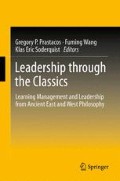Abstract
Self-interest is an important conception in Hobbesian political philosophy and classic economics. Both theories hold that rational choice to maximize interests is the best strategy to generate optimal outcome. This paper presents three arguments leading to the conclusion that the business goal set to strive for maximization of self-interest is nonmoral. What is characterized as immoral is business action that causes others harm, or fails to help others under certain morally-relevant conditions. The first argument explicates a modified stakeholder framework that enables us to explore the nexus of self- and others-interest at three different yet interconnected levels. The second argument proposes that the maximization of wisdom is the best strategy to maximize authentic self-interest in the light of Buddhist philosophy. Wisdom can be expressed as cause management, a managerial capability that needs to be cultivated not only to enhance individual lives but to wisely foresee business outcomes. The last argument provides two basic principles founded on karma theory and corresponding rules to cultivate maximization of wisdom, which can enhance the lives of individuals and positive value of businesses.
Thanks to two anonymous reviewers for useful comments and suggestions. Any errors are my own.
Access this chapter
Tax calculation will be finalised at checkout
Purchases are for personal use only
References
Beauchamp, T. L., & Childress, J. F. (2009). Principles of biomedical ethics. New York: Oxford University Press.
Freeman, R. E., Harrison, J. S., Wicks, A. C., Parmar, B. L., & Colle, S. D. (Eds.). (2010). Stakeholder theory: The state of the art. Cambridge: Cambridge University Press.
Gauthier, D. P. (1986). Morals by agreement. New York: Oxford University Press.
Parfit, D. (1984). Reasons and persons. Oxford: Clarendon Press.
Sen, A. K. (1997). Maximization and the act of choice. Econometrica, 65(4), 745–779.
Sen, A. K. (2009). The idea of justice. Cambridge: The Belknap Press of Harvard University Press.
Taisho Tripitaka Vol. 30, No. 1564, CBETA Chinese Electronic Tripitaka V1.15, http://www.cbeta.org/result/normal/T30/1564_003.htm.
Author information
Authors and Affiliations
Corresponding author
Editor information
Editors and Affiliations
Rights and permissions
Copyright information
© 2012 Springer-Verlag Berlin Heidelberg
About this chapter
Cite this chapter
Kan, WC. (2012). Maximization of What? Revisiting the Conception of Wisdom from a Buddhist Perspective. In: Prastacos, G., Wang, F., Soderquist, K. (eds) Leadership through the Classics. Springer, Berlin, Heidelberg. https://doi.org/10.1007/978-3-642-32445-1_14
Download citation
DOI: https://doi.org/10.1007/978-3-642-32445-1_14
Published:
Publisher Name: Springer, Berlin, Heidelberg
Print ISBN: 978-3-642-32444-4
Online ISBN: 978-3-642-32445-1
eBook Packages: Business and EconomicsBusiness and Management (R0)

